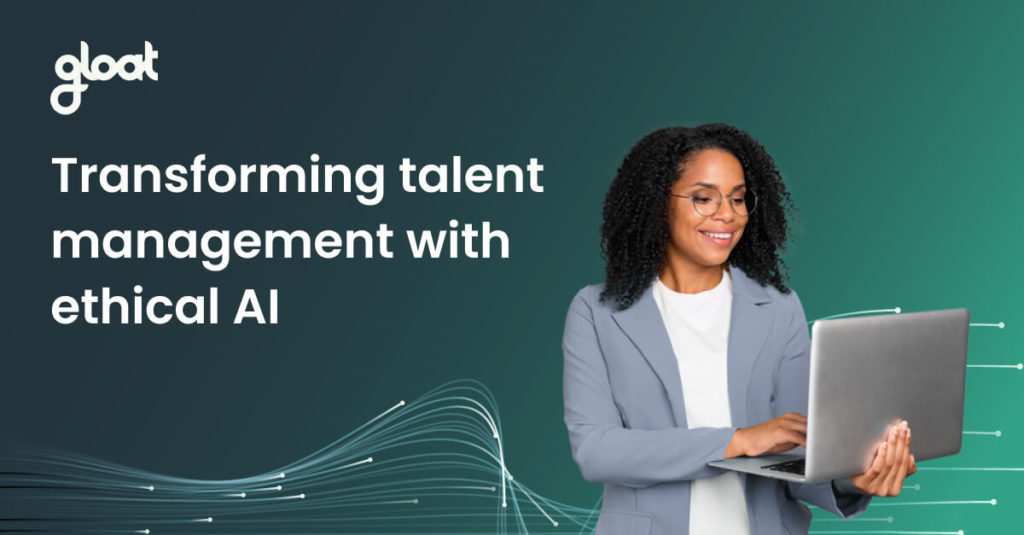The future of work: embracing responsible AI in the workplace
The rise of AI in the workplace There’s no longer any question about whether or not AI will transform the way we work—because it’s already happening. After years of speculation about how automated technologies might shape our future, we’re now starting to see how these innovations impact workflows and operating processes. From drafting emails to

The rise of AI in the workplace
There’s no longer any question about whether or not AI will transform the way we work—because it’s already happening. After years of speculation about how automated technologies might shape our future, we’re now starting to see how these innovations impact workflows and operating processes.
From drafting emails to writing lines of code, AI has the potential to enhance and augment many of our daily tasks. Yet, as use cases for automation become more mainstream, a new set of concerns about the ethical usage of AI in talent and HR applications are rising to the surface.
Some executives are worried about the proliferation of deepfakes, while others fear that AI will one day steal people’s faces, voices, or writing styles. Although these issues are valid concerns, the good news is that AI systems that are built responsibly will virtually never put confidentiality or fairness at risk. The more business leaders learn about what responsible AI usage looks like for their workforce, the better equipped they will be to harness systems that adhere to the highest standards of ethics.
Understanding responsible AI
Responsible AI is the practice of designing, developing, and deploying artificial intelligence in ways that are ethical, transparent, accountable, and aligned with laws and societal values. It involves clear governance, human oversight, and safeguards to ensure AI systems are used fairly and safely.
While AI is exploding onto the scene, that doesn’t mean that all use cases are created equally. Although AI-powered innovations have plenty of potential to revolutionize the way we work and supercharge productivity, companies must commit to using these systems responsibly to avoid some of the negative consequences associated with them. So what does it take to use AI responsibly?
Generally speaking, responsible AI usage means promoting ethical AI practices, such as creating policies to document your company’s values and guidelines and developing a well-defined review process to show how these standards of ethical use are put into practice. Ethical AI refers to the development and deployment of artificial intelligence systems that emphasize fairness, transparency, accountability, and respect for human values.
What does responsible AI mean for HR leaders?
Responsible AI means HR leaders must ensure AI tools are fair, explainable, legally compliant, and aligned with ethical standards. It requires overseeing AI-driven decisions, protecting employee data, preventing bias, and maintaining transparency in recruitment, performance, and workforce planning.
The emergence of ethical AI comes at a crucial time for talent management teams. HR leaders are grappling with complex challenges, including global skill shortages, rising burnout levels, and ongoing economic volatility. By processing enormous amounts of data at speed and scale, new AI-powered talent management tools can help personalize employee experiences, accelerate workloads by pixelating work, improve equitable access to opportunities, and dynamically resource projects.
Consequently, the widespread use of responsible AI represents a turning point for the HR profession. While HR was once considered a primarily administrative function, the development of new AI-powered tools will help HR leaders step into their new role as changemakers by giving them the insights they need to make strategic workforce planning decisions that will prepare their organizations for the future of work.
The role of HR in promoting responsible AI
The role of HR in promoting responsible AI includes setting ethical standards, ensuring fairness in hiring algorithms, collaborating with tech teams, and educating staff on AI use. HR leads policy development, monitors AI’s impact on employees, and fosters a culture of transparency and accountability.
HR leaders should go the extra mile to ensure their employees’ privacy is protected and that the AI systems their organizations implement adhere to the highest standards of ethics. Although HR teams may be tempted to experiment with many AI use cases at once, leaders must take the time to understand how each AI-powered tool works and reflect on its potential consequences. HR leaders should play a leading role in reviewing and assessing any AI-powered talent management tools their organizations are considering and collaborate with IT leaders to ensure the systems will protect their people’s privacy and mitigate bias.
What are the ethical considerations HR must address when deploying AI?
Protecting employee privacy should be a top concern for HR leaders who are considering deploying AI. The ability to use AI ethically is reliant on feeding AI models data that is sourced responsibly. According to Paula Goldman, Chief Ethical and Humane Use Officer at Salesforce, data collection needs to be a top consideration for leaders who are thinking about implementing AI-powered systems. “We often have customers coming to us very excited about AI and we’re obviously very excited as well. But the first question needs to be ‘how is your data?’”. Leaders need to ensure employees consent to their data being collected and that they understand how it will be used.
Additionally, Google’s Senior Product Inclusion and Equity Program Manager Sydney Coleman emphasizes the importance of reevaluating the language used in job descriptions to ensure bias or coded terms aren’t leading to candidate discrimination. “I think there has been a big expansion into using AI technology specifically around inclusive language,” she explains. “Having a human element to QAing is crucial and so I leverage technology to flag things like elitist language around where or whether people went to college.”
Can responsible AI still drive innovation?
At a time when every organization is looking to pivot ahead of the curve, some leaders may fear that responsible AI won’t offer the same level of innovation-boosting benefits as AI systems built upon less ethical practices. The good news is that this concern couldn’t be further from the truth. Responsible AI usage can go hand-in-hand with next-level problem solving and ideation, especially if the systems are accompanied by a culture that encourages innovative thinking.
Responsible AI systems that mitigate bias can even boost the creative process by encouraging managers to tap into talent with non-traditional backgrounds. These employees, who may have been previously overlooked, will come to the table with plenty of fresh perspectives that fuel the next generation of breakthroughs and innovations at your organization.
4 pillars of implementing responsible AI in the workplace
If you’re interested in harnessing AI to transform your talent management strategy, here’s are some guidelines to ensure you’re using these systems responsibly:
#1. Ethical considerations
When HR leaders are implementing various AI technologies, they should ensure that the vendors they’re considering take ethical usage seriously. AI should treat individuals and groups fairly, without preconceptions, prejudices, or discrimination. Systems must be careful with demographic data and ensure it does not influence the recommendations that the platform generates.
AI should be engineered and monitored to ensure that implicit biases—relying on subtle patterns in the data—are not picked up as part of the learning process. The quality of data is also essential; companies need to consider what data the AI is analyzing and put practices in place to avoid perpetuating existing biases.
#2. Fairness and bias
AI tools that are blind to data such as gender, race, ethnicity, and ability can mitigate much of the bias that’s often part of traditional talent management decisions. Systems should be engineered and monitored to ensure that implicit bias is not being picked up as part of the machine-learning process. In doing that, AI-powered tools can remove many of the career growth barriers that typically hold employees from underrepresented groups back, paving the way for more equitable growth pathways.
#3. Transparency
AI should be transparent and explainable, which in practice means that users can learn why certain candidates and opportunities are suggested. Clarifying what made a particular suggestion surface enables fairer and more equal decision-making capabilities. Vendors should strive to make AI considerations as clear as possible to the users it impacts, removing the “black box” that often surrounds AI-based suggestions. Systems should also promote transparency in the user interface and provide the required context for understanding the information that’s presented.
#4. Accountability
People who play a part in creating AI must be accountable for the systems they create and the outcomes of their use. AI systems should follow a “human-in-the-loop” model, a branch of AI that brings together AI and human intelligence to create machine-learning models. This includes creating strong data privacy policies and performing frequent algorithmic audits during which data scientists comb through source code and outputs to ensure fairness.
Advantages of adopting responsible AI in the workplace
There are several significant benefits associated with implementing responsibly-designed AI tools into your HR processes, including:
#1. Fairness in hiring decisions
Humans are inherently biased, skewed, and limited whenever we’re making choices. By augmenting decision-making with bias-mitigated recommendations, organizations can help promote more equitable hiring practices.
#2. Bias-free talent management
Traditional talent management decisions are often swayed by biases. Whether it’s an employee who has a personal connection with a hiring manager or a leader who has a slight preference for working with people from their alma mater, most of these factors are implicit.
While executives might not be aware of these swayed opinions, they often skew decisions about who gets promoted to what role, limiting the representation of different groups at senior leadership levels over time. By introducing AI-powered talent management tools like talent marketplaces, leaders can remove much of the bias that goes into these decisions. The platforms generate suggestions for internal candidates based solely on their skills and interests, ensuring that internal hiring decisions are fair and unbiased.
#3. Expand employees’ horizons
Traditionally, barriers and self-limiting beliefs shrunk talent pools and discouraged qualified internal candidates from stepping into new projects and roles. Rather than letting these obstacles hinder career mobility, AI shows employees what they’re truly capable of achieving by generating suggestions for projects, roles, and gigs based on the skills they’re bringing to the table.
As Seagate’s Global Head of Talent Marketplace and TA Transformation Divkiran Kathuria says, “A lot of women don’t tend to apply to an opportunity that isn’t a 100% fit. We hold ourselves back. But that’s the beauty of [AI systems like] the talent marketplace. It’s not asking you to sell yourself. The platform is telling you that this is an opportunity that’s fit for you.”
#4. Unleash your workforce’s full potential
The rise of AI enables HR leaders to seamlessly break down work into projects and tasks and identify evolving skill needs. Executives can then harness AI-powered platforms like the talent marketplace to dynamically connect employees with in-demand skills to open opportunities, accelerating innovation and driving growth across the organization.
How do companies measure AI responsibly?
Companies measure AI responsibly by evaluating fairness, transparency, accountability, privacy compliance, and human oversight. They use audits, impact assessments, bias detection tools, and ethical guidelines to track how AI systems perform and whether they align with corporate values and legal standards.
The path forward
The rise of ethical AI shows no signs of a slowdown. In fact, Goldman Sachs predicts that new AI innovations could substitute up to one-fourth of the work employees currently perform. Consequently, it’s never been more important for HR leaders to begin taking responsible AI usage seriously and ensuring their entire organizations are leveraging these systems ethically. To learn more about what responsible AI usage looks like in action, check out our guide, Transforming talent management with ethical AI.





